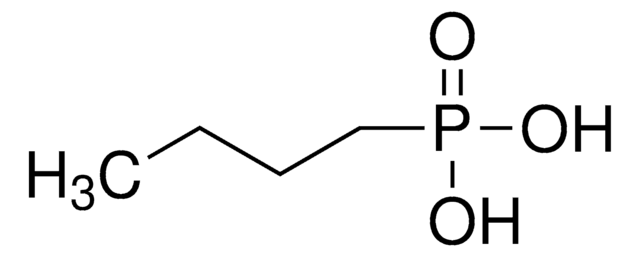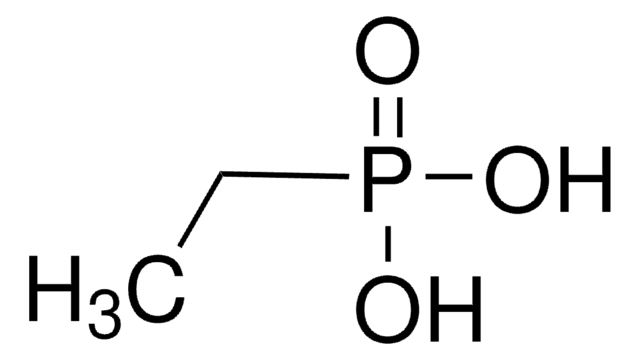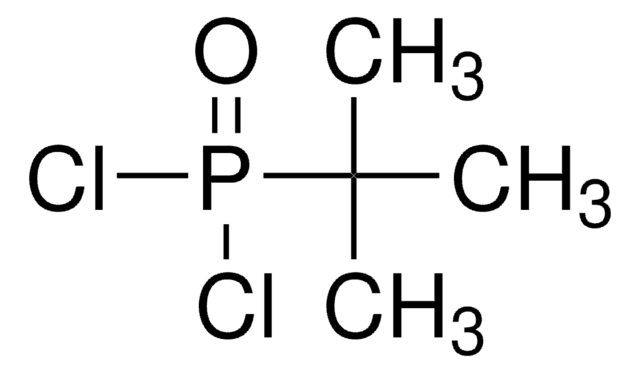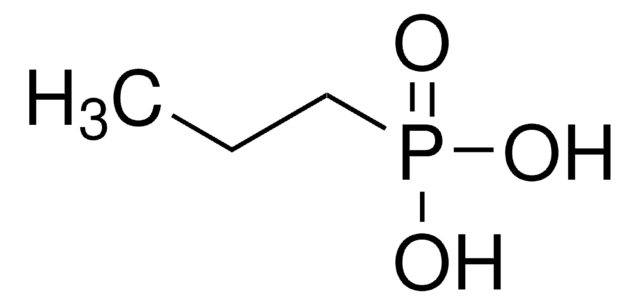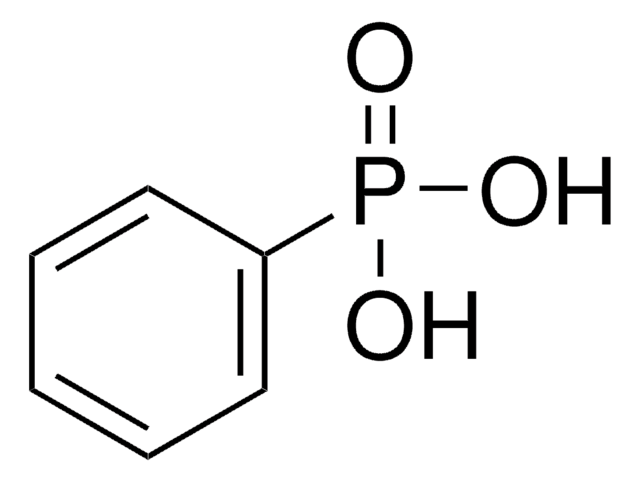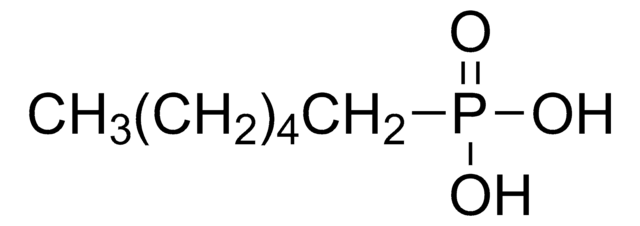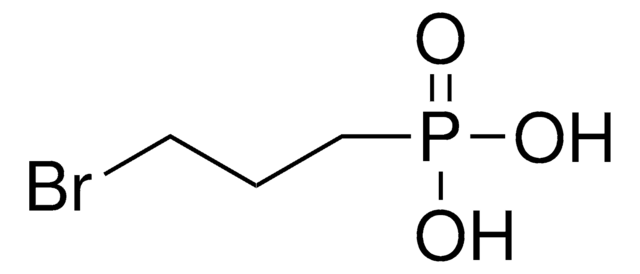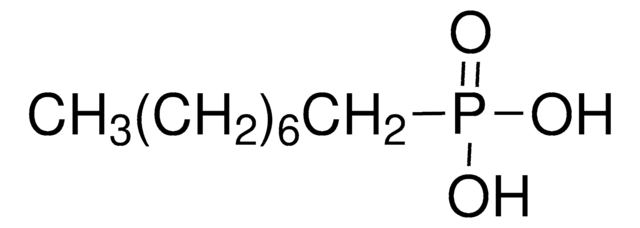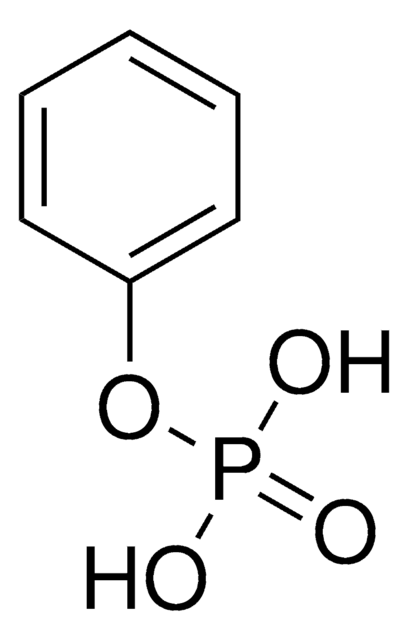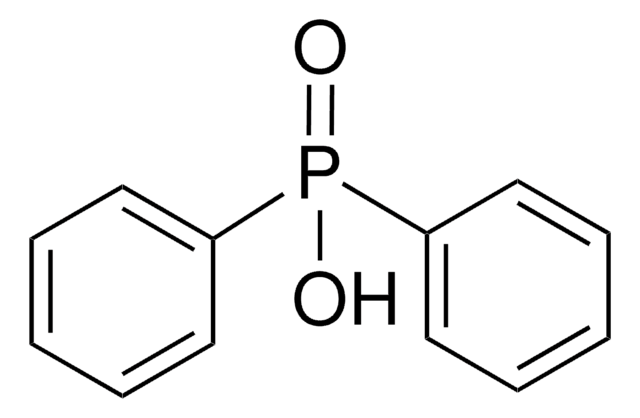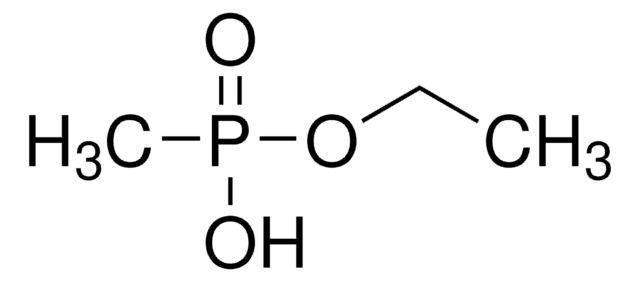305677
tert-Butylphosphonic acid
98%
Synonym(s):
P-(1,1-Dimethylethyl)phosphonic acid
Sign Into View Organizational & Contract Pricing
All Photos(2)
About This Item
Linear Formula:
(CH3)3CP(O)(OH)2
CAS Number:
Molecular Weight:
138.10
MDL number:
UNSPSC Code:
12352100
PubChem Substance ID:
NACRES:
NA.22
Assay:
98%
Recommended Products
Quality Level
Assay
98%
mp
187-189 °C (lit.)
SMILES string
CC(C)(C)P(O)(O)=O
InChI
1S/C4H11O3P/c1-4(2,3)8(5,6)7/h1-3H3,(H2,5,6,7)
InChI key
OGDSVONAYZTTDA-UHFFFAOYSA-N
Application
tert-Butylphosphonic acid was used in preparation of:
- dinuclear dicationic vanadium(IV) complexes
- borophosphonate cages
- hexanuclear copper(II) cages
- soluble molecular copper(II) phosphonates
Signal Word
Danger
Hazard Statements
Precautionary Statements
Hazard Classifications
Eye Dam. 1 - Skin Corr. 1B
Storage Class Code
8A - Combustible corrosive hazardous materials
WGK
WGK 3
Personal Protective Equipment
dust mask type N95 (US), Eyeshields, Gloves
Choose from one of the most recent versions:
Already Own This Product?
Find documentation for the products that you have recently purchased in the Document Library.
Customers Also Viewed
E Fanizza et al.
Nanoscale, 8(6), 3350-3361 (2016-01-15)
Here a luminescent hybrid nanostructure based on functionalized quantum dots (QDs) is used as a fluorescent imaging agent able to target selectively mitochondria thanks to the molecular recognition of the translocator protein (TSPO). The selective targeting of such an 18
Pius O Adelani et al.
Inorganic chemistry, 58(19), 12662-12668 (2019-09-13)
We report herein a general synthetic approach for designing uranyl coordination cages. Compounds 1 and 2 are constructed through a temperature-dependent and solvent-driven self-assembly. In both cases, the synthetic strategy involves in situ phosphonate ligand condensation into a flexible pyrophosphonate
Vadapalli Chandrasekhar et al.
Inorganic chemistry, 51(10), 5605-5616 (2012-05-12)
A multicomponent synthetic strategy involving copper(II) ions, tert-butylphosphonic acid (t-BuPO(3)H(2)) and 3-substituted pyrazole ligands has been adopted for the synthesis of soluble molecular copper(II) phosphonates. The use of six different 3-substituted pyrazoles, 3-R-PzH [R = H, Me, CF(3), Ph, 2-pyridyl
Saskia Speed et al.
Inorganic chemistry, 51(12), 6842-6850 (2012-05-26)
The syntheses, structural characterization, and magnetic behavior of two new hexanuclear copper(II) complexes derived from R-phosphonic acids and 1,3-bis(dimethylamino)-2-propanol (Hbdmap) with formulas [Cu(6)(μ-bdmap)(3)(μ(3)-Ph-PO(3))(2)(μ(3)-O···H···μ(3)-O)(ClO(4))(2)(H(2)O)]·5H(2)O (1) and [Cu(6)(μ-bdmap)(3)(μ(3)-t-Bu-PO(3))(2)(μ(3)-O···H···μ(3)-O)(μ(1,3)-dca)(dca)(H(2)O)]·6H(2)O (2) (Ph-H(2)PO(3) = phenylphosphonic acid, t-Bu-H(2)PO(3) = tert-butylphosphonic acid, dca = dicyanamide) are reported.
Justus Tönnemann et al.
Chemistry (Weinheim an der Bergstrasse, Germany), 18(32), 9939-9945 (2012-07-06)
A versatile and experimentally facile procedure for the synthesis of borophosphonate cages of the general formula [tBuPO(3)BR'](4) is described. The method involves heating of tert-butylphosphonic acid with a boronic acid in toluene to give borophosphonates in [4+4] condensation reactions. The
Our team of scientists has experience in all areas of research including Life Science, Material Science, Chemical Synthesis, Chromatography, Analytical and many others.
Contact Technical Service